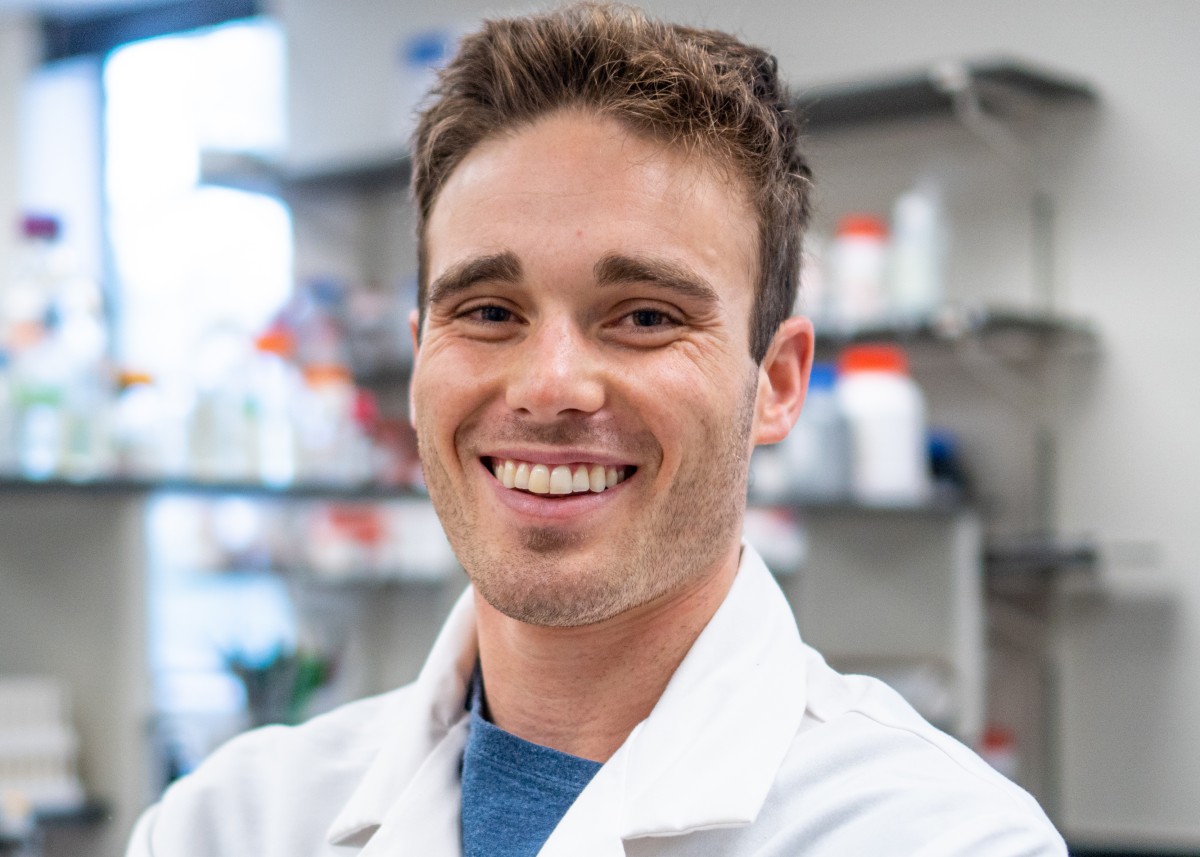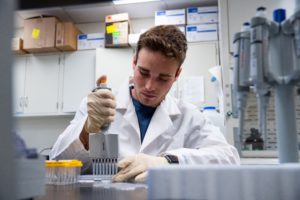
Elliot Graham, a Ph.D. candidate in the department of Food Science and Human Nutrition at Colorado State University, is one of three students to receive the 2022-23 Dean’s Fellowship from the College of Health and Human Sciences. The Dean’s Fellowship provides a $20,000 grant for doctoral students to expand their research in their respective fields.
The goal of Graham’s research is to further understand how excess weight gain changes the types and abundances of bacteria in the human gut, leading to downstream injury of blood vessels. Graham is also interested in researching how changes in one’s diet can affect the damage in one’s blood cells, potentially halting further damage. His research is surrounded by an “immense joy in being able to have the creative freedom to answer the scientific questions that pop into my head,” Graham said.
Graham is mentored by FHSN Department Head Chris Gentile and Tiffany Weir, associate professor in FSHN.
Read the interview below to learn more about Graham and his research.
Tell us about your undergraduate experience. What inspired you to continue to grad school and to apply for the Dean’s Fellowship?
I started conducting research during my junior year of college as a research assistant for Dr. Denise Smith in the First Responder Health and Safety Lab at Skidmore College. Dr. Smith’s laboratory studies the cardiovascular health of first responders, namely firefighters, by investigating the relationships between live active firefighting and dysfunction of the heart and blood vessels. Dr. Smith would also collaborate with Dr. Julie Douglas, a renowned statistician who would help with statistically analyzing the clinical data. Dr. Smith and Dr. Douglas were indispensable parts of my undergraduate research career, as Dr. Smith would mentor me on heart and blood vessel function while Dr. Douglas and I would work together to analyze compiled firefighter data by fitting complex statistical models.
Throughout my undergraduate schooling, I gained two life-long mentors and a strong understanding of cardiovascular disease and statistics. However, being so interested in research and the impact it can have on human (cardiovascular) health, my undergraduate research career solidified my desire to go to graduate school and further my training in cardiovascular research. Once I settled in at CSU, I wanted to apply for the Dean’s Fellowship to convey to the college that my recent research can help understand the complex yet important relationship between diet, obesity, and cardiovascular disease. In addition, I wanted to get funding to conduct research aimed to help our community mitigate the detrimental effects of obesity on cardiovascular disease.
Can you describe your research project and its significance? What do you hope will be the long-term impacts of your research?

Briefly, the broad goal of my research is to further understand how excess weight gain (i.e. obesity) changes the types and abundances of bacteria in our gut, or the gut microbiota, leading to downstream injury of blood vessels. Also, I am interested in how changing one’s diet, either through supplementation or calorie restriction, can halt the detrimental changes to the gut microbiota seen during obesity, ultimately leading to reduced damage to blood vessels. I hope that my research suggests to the public that regulated and beneficial dietary manipulation is one of the most important ways to mitigate the effects of obesity on cardiovascular disease.
How has your college education helped you get this far in your field?
Being a Health and Human Physiology Major with minors in Biology and Statistics has fostered a great understanding of human (and mouse) physiology, particularly cardiovascular physiology. In addition, I have learned how to answer my own scientific questions through fitting statistical models and use statistics in a conscientious and ethical manner. I believe these tenets of my college education have led me to be a curious and knowledgeable budding researcher. Also, one of my CSU mentors, Christopher Gentile, is an alumnus from my alma mater. So, without the networking process and the push from my undergraduate professors to reach out to Chris, I might not be where I am today!
What inspired you to focus on this research?
As basic as this sounds, I find immense joy in being able to have the creative freedom to answer the scientific questions that pop into my head. Research is one of the only professions that allows someone to actively answer their own questions. This is what interested me about research. Furthermore, I enjoy sharing my findings with different communities, whether that be through poster presentations, lectures, PowerPoints, manuscripts, grants, etc.
How have your mentors helped to guide you throughout your career so far?
My undergraduate mentors, Dr. Smith and Dr. Douglas, were the people to get me interested in conducting research, so without them none of this would be possible. My current primary mentors, Dr. Christopher Gentile and Tiffany Weir, have created such a welcoming and stimulating scientific environment and have allowed me to lead and direct my own studies. This opportunity has given me a glimpse into what it would be like to have my own laboratory someday. Other mentors of mine, either through research collaborations (Dr. Marcela Henao-Tamayo) or through my dissertation committee (Dr. Alan Schenkel and Dr. Chris Melby) have without a doubt helped mold me into the budding scientist I aspire to be. Although I have a lot more learning to do, I believe I could not be in a better position or environment to learn the principles of conducting sound and relevant research.
The Department of Food Science and Human Nutrition is part of CSU’s College of Health and Human Sciences.